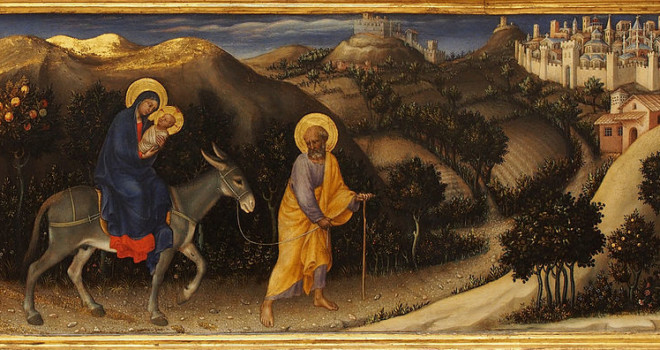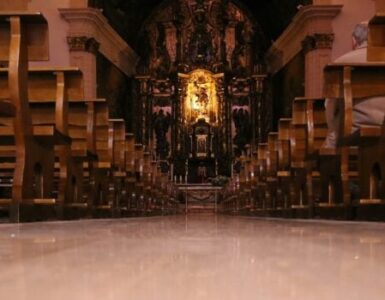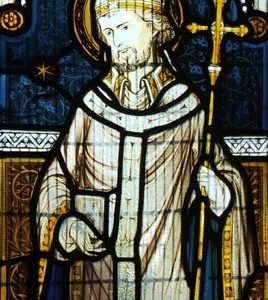In Holy Scripture special emphasis is given to the fact that Saint Joseph was the husband of Mary: “Jacob begot Joseph, the husband of Mary, of whom was born Jesus, who is called Christ” (Matt. 1:16). From this circumstance the weightiest consequences result for Saint Joseph, above all, his relationship to Mary, which was threefold.
Husband by Marriage
First, the saint is the husband, the spouse, of Mary by his marriage contract with her. Holy Writ bears incontrovertible witness to this marriage (Matt. 1:16, 24; Luke 1:27; 2:48). All the holy Fathers and Doctors see in this union a true, genuine, and perfect marriage; and this because of the words of Holy Scripture and also because of the fact that all the conditions of a matrimonial contract are verified — namely, the mutual surrender of each to the other to lead a wedded life, the spiritual meaning of the marriage bond, which typifies the union of Christ with His Church (Eph. 5:32), and, finally, the blessing of a progeny.
Mary really belonged to Joseph with all she was and possessed. No other person so possessed her esteem, subjection, and love. This union not only brought Saint Joseph into association with Mary, but it was his privilege to behold continually her array of virtues and share with her a mutual exchange of spiritual goods.
Finally, there were the reality, truth, honor, and happiness of being father to the Savior. This fatherhood, the providential task and official position of Saint Joseph in the Kingdom of God, has its true and particular foundation in a special way in the matrimonial union with Mary. Without this marriage, the fatherhood of Joseph would be a kind of adoptive fatherhood, by reason of the adoption of a child; but on account of his marriage with Mary, Joseph is infinitely more the father of Jesus, a true, real, and legal father; and he is acknowledged such before God and men, just because, by reason of his union with Mary, a perfect, juridical exchange of goods between man and wife is effected.
Whatever Mary had possessed belonged by right to Saint Joseph also, by reason of a community of goods; and hence, this included her Son, even though the latter had been given to her by God in a wonderful way. Jesus belonged to Joseph as his legal father.
According to God’s decree, the marriage between Joseph and Mary was the way in which the introduction of Christ into the world was to be accomplished. The nuptial union of Saint Joseph with Mary was really a great divine mystery, from which all benefits were to come to us.
St. Joseph, Protector & Witness
Saint Joseph is not only the husband of Mary, but also the protector and witness of her virginity. This mutual virginity of Joseph and Mary belonged essentially to the divine plan of the Incarnation. It behooved Saint Joseph to be both the husband of Mary and the protector of her virginity, as he was in fact. In this sense an illustrious orator says that Joseph and Mary mutually presented their virginity to each other that it might be mutually protected; and their matrimonial fidelity consisted in this, that they were to protect their virginity.
This marriage was decreed by God in view of the conception and birth of Jesus; and hence, Saint Joseph had to espouse the Mother of God, who as such was to remain a virgin according to the prophecies, that thus the temporal birth of the Son of God without a father should be a sublime and wonderful representation of His eternal generation without a mother.
Mary and Joseph were like two stars, whose pure rays merged into one, to shine in the presence of God with the much more brilliant luster of an entirely divine purpose and appointment. Thus, this marriage more than any other fulfilled the sublime, mystical purpose of matrimony — namely, to be by its purity a faithful image of Christ’s union with mankind and His Church. Saint Joseph, however, not only venerated and protected the Blessed Virgin, but was, too, in her regard, a witness and a refuge beyond the shadow of suspicion just because of his nuptial bond with Mary.
Thus, Saint Joseph, like the cherub of old, stands guard
with a flaming sword near the paradise of his spouse’s virginity, a new reason
for Mary’s gratitude to and love for Joseph, her husband and virginal spouse.
Mary is especially styled the “Spouse of the Holy Spirit,” not merely by the
power of sanctifying grace, the possession of which placed her in the position
of spouse of the Holy Spirit, but because the Holy Spirit effected the
Incarnation in her and through her. In this higher sense the Holy Spirit is in
a unique way the Spouse of Mary, while Joseph, without ceasing to be Mary’s
spouse, is the “friend of the bridegroom.”
According to the Fathers of the Church, virginity is something in the flesh but not of the flesh, something spiritual, angelic, indeed, a reflection in man of the eternal, infinite beauty. Wherever God sees it, He forgets the lowliness of our carnal and earthly nature. Hence God selects a virginal father and a virginal mother, and finds in them a paradise of pleasure precisely because of their purity and virginity.
The Ends of Holy Marriage
The third relationship of Joseph to Mary again results from his quality of husband and spouse, and belongs to the purposes of a matrimonial contract. The principal end of matrimony is the procreation of children. This end was realized in the case of our saint in a higher and more wonderful manner through the virginal conception of our Savior.
The second end of matrimony consists in the advantage of mutual association, and every sort of cooperation. Saint Joseph was the faithful, loving companion, support, and comforter of the Mother of God.
Mary’s life was intended to be that of God’s Mother, of the Mother of the Savior, who came upon earth to redeem the world by toil, suffering, and the Cross. Mary’s life, too, was arranged according to this pattern, and in it Saint Joseph was to be her support and help. And thus we meet the Holy Family, if not in extreme poverty, at least in such need that Mary and Joseph were obliged to toil with their royal hands for their daily sustenance and that of the Christ Child; we find them on journeys just because of this child, fleeing in torturing perplexity from powerful persecutors into a strange, heathen country. This demanded decisive help, persevering action, and unfaltering courage.
All these the delicate mother and virgin found in Saint Joseph. He was her guide and leader, her staff and support. Just as the People of Israel of old journeyed through the desert under the protection of the “pillar of cloud,” so the Holy Family travel from Nazareth to Jerusalem, to Bethlehem, and as far as the land of Egypt, under the guidance and protection of faithful Saint Joseph. This is why the old mosaics invariably represent the saint with a staff in his hand; it is the symbol of guidance, protection, and defense.
How homelike, peaceful, and expressive of mutual love was the domestic life of the Holy Family in its willing submission to Saint Joseph’s fatherly authority! The reason for this happy family life was the unlimited regard of the saint for Mary. How his esteem and veneration for the virgin must have increased when he learned that she was unsurpassedly holy and was even the Mother of God! His love for Mary, furthermore, was based upon this esteem for her. How every circumstance in the natural and supernatural order here combined to enhance this love for Mary in the heart of Joseph: the amiability and sanctity of his spouse, his own loving heart and intense realization of his responsibilities and God’s holy will! Besides God and the divine Child, no one was so loved by Joseph as was Mary. Here, indeed, the Holy Spirit Himself was the bond of love that united both hearts.
From true love, peace and joy always arise. We have already seen how peaceful a character Saint Joseph was. Nothing disturbed the peace and happiness of this earthly sanctuary. Even Jesus and Mary could find their edification in the calm, humble, and profound virtue, purity, and sanctity of Joseph. In the company of the divine Child and of her spouse, Mary no longer yearned for the courts of the Lord in Jerusalem, where, as a child of the Temple, she had dedicated her youth to God. Here there was more than the Ark of the Covenant and more than the high priest!
The happiest proof of how Joseph fulfilled all the duties and offices of husband and spouse toward Mary is the naturalness and easy grace and childlike confidence with which she submitted to Saint Joseph’s guidance and could thus say with the spouse in the Canticle; “I sat down under His shadow, whom I desired” (Song of Sol. 2:3). Just as the Israelite in Solomon’s time sat without fear, securely and trustfully, under his fig tree and vine, which nurtured him, so Jesus and Mary lived under the protection and loving care of Joseph.
✠
This article is adapted from a chapter in Fr. Meschler’s The Truth About Saint Joseph: Encountering the Most Hidden of Saints. It is available as an ebook or paperback through Sophia Institute Press.
You can read other reflections from Fr. Meschler here on Catholic Exchange.
image: Scene of Flight in Egypt by Gentile da Fabriano, Uffizi Gallery / Photo by Petar Milošević / [Public domain], via Wikimedia Commons













